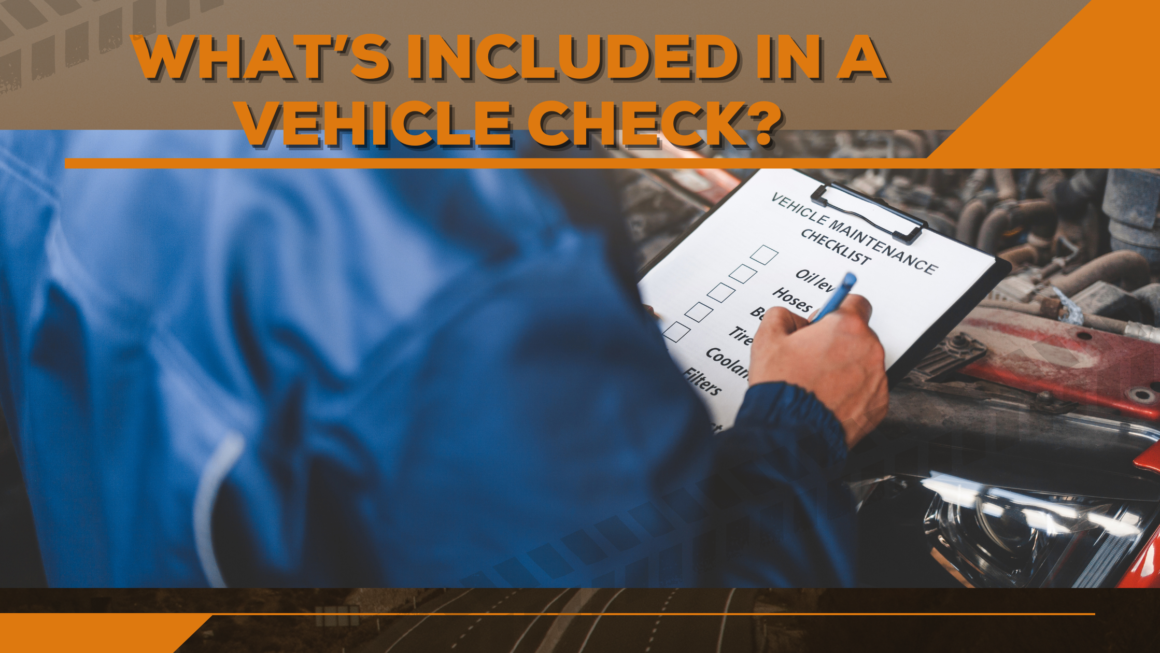Owning a car comes with the important responsibility of maintaining it to ensure it remains safe, reliable, and efficient. Regular servicing and timely repairs are crucial in preventing unexpected breakdowns, extending the life of your vehicle, and saving you money in the long run. Understanding and keeping up with essential auto services can help keep your car performing at its best, offering peace of mind for every journey.
Regular Car Servicing
Routine car servicing is essential for maintaining your vehicle’s health and ensuring it runs smoothly. Regular maintenance helps prevent small issues from turning into expensive repairs and keeps your car operating at its best, which is key to both safety and long-term reliability.
During a standard vehicle check, technicians typically inspect oil levels, filters, fluids, brakes, tyres, and battery health. Understanding what’s covered in these checks gives you better control over your car’s upkeep and ensures you’re not missing any critical steps.
Why Regular Servicing Is Essential
- Prevents unexpected breakdowns and costly repairs.
Timely servicing catches small issues before they become major, expensive problems. Regular checks can identify wear and tear, reducing the risk of sudden breakdowns that could leave you stranded or facing hefty repair bills. - Ensures the vehicle’s systems are operating at optimal performance.
From the engine to the electrical system, each part of your car relies on regular maintenance to perform efficiently. Servicing ensures that everything is running smoothly, helping your car deliver its best performance and fuel efficiency. - Maintains the car’s resale value.
A well-maintained vehicle holds its value better than one that’s neglected. Regular servicing shows potential buyers that the car has been taken care of, which can help you secure a better resale price down the line.
What’s Included in a Regular Service?
- Oil and filter change for engine longevity.
The engine oil and filter play a crucial role in keeping your engine running smoothly by lubricating parts and preventing friction. Regular oil changes help prevent engine wear and improve fuel efficiency. - Fluid checks and replacements (coolant, brake fluid, etc.).
Over time, various fluids in your vehicle—such as coolant, brake fluid, and transmission fluid—can degrade. Regular checks and top-ups ensure that your car operates at peak performance and reduces the risk of overheating or brake failure. - Tire and brake inspections.
Tires and brakes are vital for safety, and they wear down with use. Regular inspections help ensure your tires have sufficient tread, and your brakes are functioning properly, so you can drive safely. - Battery and electrical system checks.
A failing battery can cause your car to stall or not start at all. Regular checks of the battery and electrical systems help prevent unexpected issues and ensure your car’s electrical components are working as they should.
Tyre Maintenance and Replacement
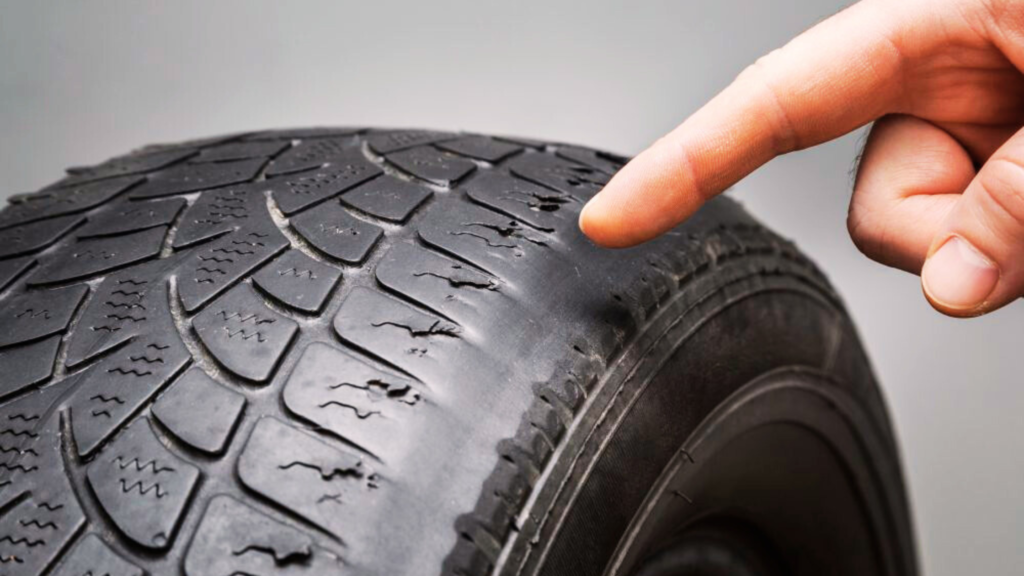
Tyre care is crucial not only for your safety but also for maximizing your vehicle’s fuel efficiency. Well-maintained tyres improve road grip, reduce fuel consumption, and enhance the overall performance of your car.
Different tyre types offer specific benefits depending on the driving environment and season. Understanding these differences—such as those between summer, winter, and all-season options—can help you make more informed decisions. A detailed guide on tyre types explains how to choose the right one based on your driving habits and local conditions.
How Often Should You Check Your Tyres?
- Regular checks for pressure, tread wear, and damage.
Keeping an eye on your tyre pressure and tread depth ensures safe driving and optimal fuel efficiency. Under-inflated tyres can lead to uneven wear and poor fuel economy, while excessive wear can compromise your grip on the road. - Seasonal tyre changes for better performance in extreme conditions.
Switching between summer and winter tyres is essential for maintaining optimal performance in different weather conditions. Winter tyres provide better grip in cold, icy conditions, while summer tyres are designed to perform better in warmer weather, improving handling and fuel efficiency.
If you’re unsure which tyre category suits your needs best, this overview of tyre types outlines the key differences between them—helping you match your tyres to the roads and climate you drive in most.
Signs You Need to Replace Your Tyres
- Uneven or worn tread.
Tread depth is vital for maintaining proper traction, especially on wet or slippery roads. If the tread is worn unevenly or below the legal minimum, it’s time to replace the tyres. - Visible cracks or bulges.
Tyres with visible cracks, bulges, or other damage are unsafe and can lead to tyre failure while driving. Cracks indicate deterioration, while bulges are often signs of internal damage that can cause a blowout. - Reduced traction or handling issues.
If you notice your car pulling to one side or a decrease in grip, it’s a clear sign your tyres may need replacing. Worn tyres can affect steering and braking, making your car harder to control.
Regularly inspecting your tyres and replacing them when necessary ensures that your vehicle remains safe and performs at its best, keeping you and others on the road safe.
Brake Inspections and Maintenance
Brakes are one of the most critical components of your car, directly affecting your safety on the road. Regular brake inspections and maintenance ensure that your vehicle can stop effectively in emergency situations, preventing accidents and maintaining your overall vehicle performance.
Why You Should Never Skip Brake Inspections
- Ensures your brakes are functioning properly.
Brake inspections help identify any wear or issues that could impair your ability to stop quickly and safely. Regular checks ensure that all components, such as pads, discs, and fluid levels, are in top condition. - Helps prevent accidents due to brake failure.
Faulty brakes are a leading cause of accidents, often resulting from worn-out brake pads or fluid leaks. Timely inspections catch these issues early, reducing the risk of brake failure while driving. - Reduces costly repairs by catching issues early.
Small problems, if left unchecked, can lead to more serious and expensive repairs down the line. Regular brake maintenance ensures that minor issues are addressed before they escalate, saving you money on larger repairs or replacements.
Proper brake inspections are essential not only for safety but also for ensuring that your car is running smoothly and efficiently.
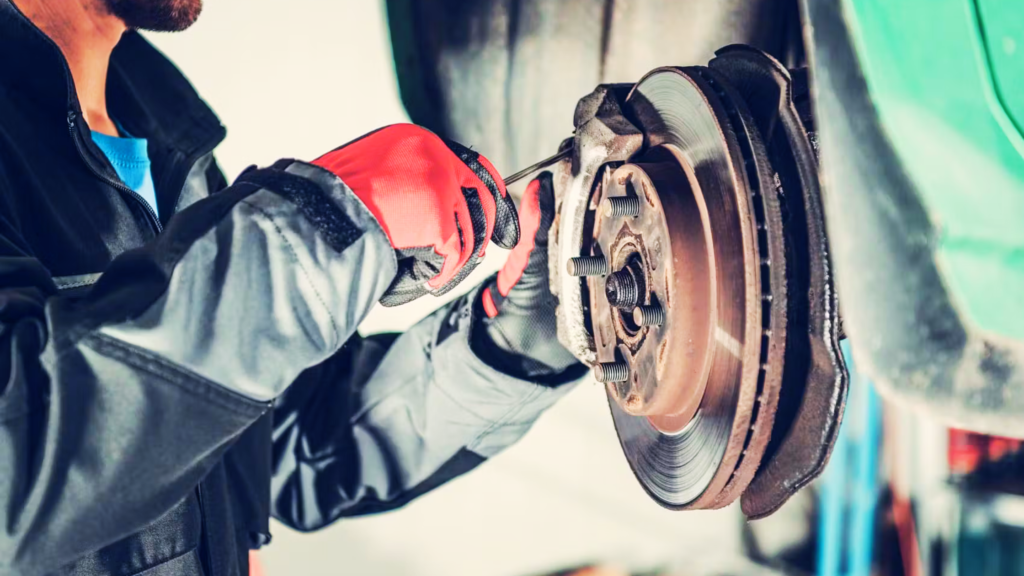
Common Brake Issues and How to Spot Them
- Squealing or grinding noises.
High-pitched squealing or grinding sounds when applying the brakes usually indicate worn-out brake pads or dirt and debris between the pads and discs. These noises should not be ignored as they signal the need for maintenance. - Brake fluid leaks or low fluid levels.
Low brake fluid can affect your braking performance, making it harder to stop effectively. Leaks in the brake lines or a drop in fluid levels are signs of a serious problem that needs immediate attention. - Unresponsive or spongy brake pedals.
If the brake pedal feels soft or spongy when you press it, there could be air in the brake lines, a leak, or low brake fluid. This issue can significantly reduce braking power and should be addressed as soon as possible.
Being proactive with brake maintenance ensures your safety on the road and helps maintain the efficiency of your braking system.
Battery and Electrical System Check
Your car’s electrical system plays a crucial role in starting the engine and running various functions such as lights, air conditioning, and entertainment systems. Regular checks and maintenance of your vehicle’s battery and electrical system help prevent unexpected breakdowns and ensure your car runs efficiently.
Why Battery Maintenance Matters
- Prevents sudden breakdowns due to a dead battery.
A failing battery is one of the leading causes of car breakdowns, often leaving you stranded unexpectedly. Regular battery checks can detect early signs of wear and prevent sudden failure. - Increases battery lifespan with regular checks.
By keeping an eye on your battery’s health, you can extend its lifespan and avoid premature replacement. Regular maintenance, including cleaning and checking connections, ensures the battery remains in good condition for longer.
Maintaining your battery can save you from the inconvenience and cost of unexpected breakdowns.

Common Battery and Electrical System Issues
- Difficulty starting the engine.
If your car struggles to start, it may be due to a weak or failing battery. This could also be a sign that your alternator is not charging the battery properly, requiring prompt attention. - Dim lights or electrical malfunctions.
If the lights in your car appear dimmer than usual or electrical systems (like the radio or air conditioning) are malfunctioning, it could indicate an issue with the battery or electrical connections, which may require immediate attention. - Corroded battery terminals.
Corrosion around the battery terminals can prevent proper charging and affect the overall performance of your vehicle. Regularly cleaning the terminals helps prevent buildup and ensures the electrical system works properly.
Routine checks of your car’s battery and electrical system can prevent major issues, ensuring that your car starts smoothly and all systems function as they should.
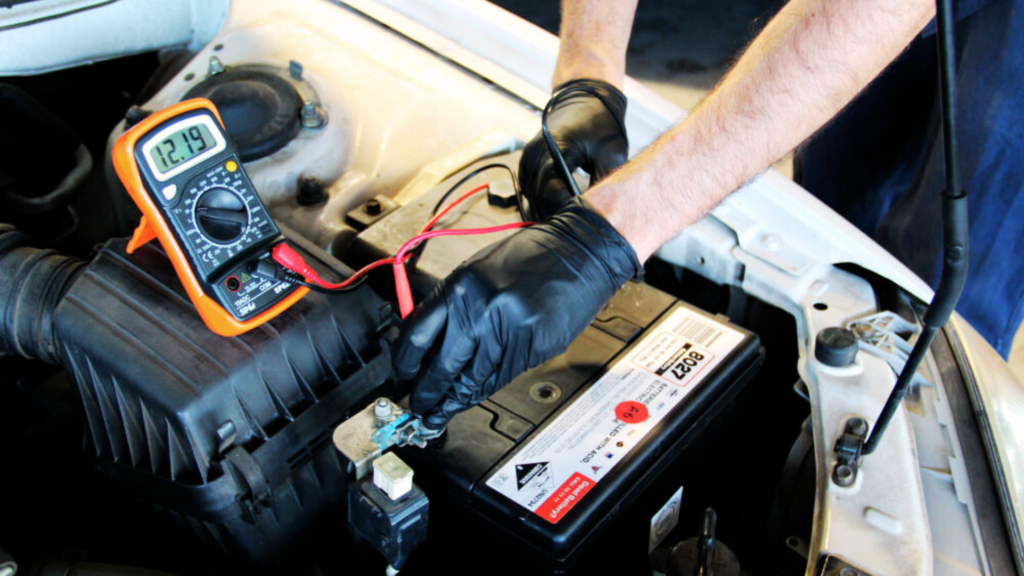
MOT and Emissions Testing
An MOT (Ministry of Transport) test is a legal requirement in many countries to ensure that vehicles meet safety and environmental standards. This test is essential for keeping your car roadworthy, reducing emissions, and ensuring that it operates efficiently.
What Does a MOT Test Cover?
- Exhaust system and emissions testing.
The exhaust system is checked to ensure that your vehicle’s emissions are within the legal limits. Excessive emissions can harm the environment, and an MOT test ensures that your car is not contributing to unnecessary pollution. - Brake and suspension checks.
The brakes and suspension system are inspected to ensure your car can stop safely and handle bumps or uneven surfaces effectively. Faults in these systems can lead to accidents, so regular checks are crucial for safety. - Light, signaling, and tire inspections.
The MOT test ensures that all lights, indicators, and tires are in proper working order. Faulty lights or worn-out tires can affect your visibility and control, putting you and other drivers at risk.
Much of what’s evaluated during a MOT overlaps with the core components of a standard vehicle check, including tyres, brakes, lights, and emissions. Familiarising yourself with what these checks entail can make both servicing and testing more straightforward.
Why Is an MOT Test Important?
- It ensures your vehicle is roadworthy.
The MOT test checks the fundamental aspects of your vehicle’s safety, including brakes, tires, lights, and emissions. This ensures that your car is in good condition to be driven on the road without posing a danger to you or others. - Keeps you legally compliant and avoids fines.
In many countries, an MOT test is mandatory for vehicles over a certain age. Failing to keep your MOT up to date can result in fines and legal penalties. Keeping your car tested and certified ensures that you’re driving legally and avoid costly fines. - Helps you catch problems early before they become costly.
An MOT test is a proactive way to identify minor issues before they become major, expensive repairs. Regular testing helps ensure that any potential issues are caught early, giving you time to address them without the need for expensive fixes down the line.
Regular MOT testing keeps your vehicle safe, legally compliant, and running smoothly, preventing costly repairs and ensuring peace of mind on the road.
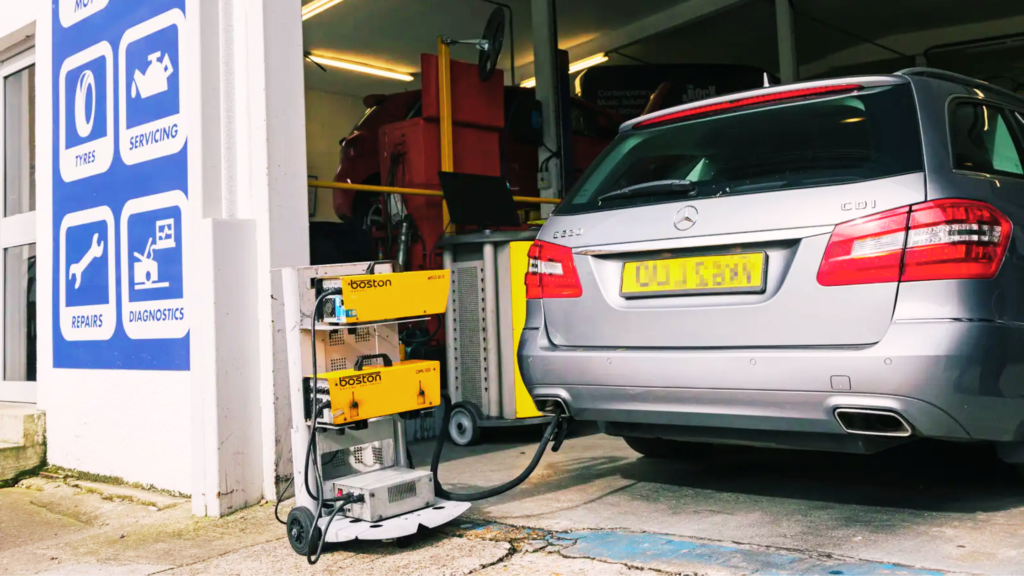
Air Conditioning Maintenance
The air conditioning system is essential for comfort, especially during the warmer months when temperatures rise and you need a cool, breathable environment inside your car. A well-maintained AC system ensures that you stay comfortable and refreshed throughout your journey, making it an important part of your vehicle’s overall performance.
Why You Should Regularly Maintain Your AC
Regular maintenance of your car’s air conditioning system ensures that it provides efficient cooling during the summer months when it’s needed most. A properly maintained AC prevents potential leaks or malfunctions that could leave you without cooling on a hot day. Additionally, keeping the system clean ensures the air inside your car remains fresh and free from unpleasant odors or contaminants, improving the overall air quality.
Common AC Problems and How to Avoid Them
Foul smells are a common sign of mold or bacteria buildup within the AC system, often caused by moisture accumulation. If left unchecked, this can lead to unpleasant odors every time you turn on the AC. Weak airflow or no cooling at all indicates issues such as low refrigerant levels or clogged air filters, both of which can significantly reduce the system’s efficiency. Odd noises while the system is running could point to problems with the compressor or other components, which should be addressed to avoid a breakdown. Regular checks and servicing can help identify and prevent these issues before they become serious problems.
Conclusion: Keep Your Vehicle in Top Shape with Essential Auto Services
Taking care of your vehicle doesn’t have to be overwhelming. By staying on top of regular maintenance, such as servicing, tyre checks, brake inspections, and air conditioning care, you can ensure your car runs smoothly and safely for years to come. Regular maintenance not only enhances your safety on the road but also increases the longevity of your vehicle. Don’t wait until something breaks down—being proactive with these essential auto services can save you time, money, and a lot of stress in the long run, keeping your car performing at its best for as long as possible.


